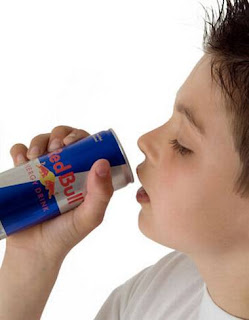Scenario:
Matt is in 5th grade and loves to
drink energy drinks, especially Monster. He and his friends will buy one and
pass it around during school when the teacher isn’t looking, and regularly
drink them at home. They also love to have one before soccer practice because
it provides extra energy and they think it helps hydrate them. In school they
are learning about healthy nutrition and the teacher tells them that energy
drinks are bad for them and aren’t allowed at school, but Matt doesn't care
and thinks those rules are stupid. How could a tasty drink possibly be so bad
for him? He likes how they taste and how they make him feel, and its cool to
have one at school since it’s a little bit dangerous.
His parents don’t know the
nutrition facts about the drinks so they don’t think it’s bad, and have been
buying them by the case from Costco. He now drinks at least 1 Monster every
day. Recently Matt has struggled to fall asleep and experienced some dizziness
and confusion, but he doesn't know why. Today, after quickly drinking
a Monster before class, he started to feel a pounding headache, nausea, and his
heart felt like it was going to explode. His teacher called an ambulance and he
was rushed to the hospital where he was treated for chronic caffeine poisoning
and dehydration.
Questions for Discussion:
1. Why does Matt like to drink
energy drinks? Do you know anyone who drinks them that much? Why do
you think they like it? Could they be addictive?
2. How often do you drink energy
drinks, and how do they make you feel? Do you think they are bad for
you? How much do you know about the ingredients and their effects on a
person, such as caffeine?
3. Why do you think Matt and his
friends didn’t listen to their teacher when she tried to explain how the drinks
are bad for them?
4. Who do energy drinks target in
their advertising? Do you think the energy drink advertising has anything to do
with why Matt likes them and thinks they are okay for him?
5. What do you think about kids and
young people drinking energy drinks? Do you think they should or should
not drink them? What would you say to your younger sibling if they wanted
to drink one?
6. Do you think that energy drinks
should have warning labels so that people know how dangerous they can be,
especially for a young person? Why or why not?
Factoids:
**Adverse effects associated with
energy drink consumption include nervousness, irritability, sleeplessness,
increased urination, abnormal heart rhythms, decreased bone levels, and stomach
upset.
**
Taurine is a common ingredient found in energy drinks. It has been linked to
illnesses ranging from high blood pressure to strokes and seizures to heart
disease.
**According
to Drug Information Online, symptoms of caffeine overdose include vomiting,
hallucinations, rapid heartbeat, convulsions and death. Toxic side effects may
be felt at doses exceeding 200 mg., while death can occur at doses ranging from
3 to 20 grams. avoid overdose, monitor your daily intake of caffeine from
all sources. Read food and beverage labels, and learn to identify common
caffeine-containing herbs like yerba mate, guarana and kola nut.
**Energy drinks are marketed as healthy, fun and youthful, with many brands using action sports like skating, snowboarding and Formula 1 to appeal to children and young people.
**People
tend to refer to energy drinks and sports drinks interchangeably, but they are
NOT the same. Sports drinks are designed for those who are involved in
physical activity. Energy drinks are a mental stimulant. Energy drinks don’t tend to mix well with exercise,
because of the high caffeine content which can lead to dehydration. While
Gatorade, Powerade and other sports drinks can refuel the body while
replenishing salts and helping the body absorb fluids, energy drinks can only
give a quick boost of energy.
**Scientists
say that caffeine can have an effect on the growing brain and may cause a decline
in the body’s immune system, so it is best to avoid giving children under the
age of 10 products containing caffeine, especially energy drinks. The human
brain continues to grow up to about age 16 (some even say up to the age of 21).
**Just over 1,100 ER visits in 2005
linked to high energy drinks has grown to more than 16,000 in 2008 and more
than 13,000 in 2009.
**Some
energy drinks contain high amounts of sugar, equal to around 5 teaspoons per
250 ml can, so a young person is likely to gain weight if regularly consuming
these.
**2011 Fourteen-year-old Anais
Fournier, died after she reportedly consumed two 24 ounce Monsters (480mg of
caffeine) in a 24 hour period. Cause of death was a heart arrhythmia due
to caffeine toxicity. There seems to be some conflicting
stories as to how much she really consumed and this seems true since 480mg in a
24 hour period isn’t a toxic amount.
How Mentors Can Help:
**Ensure your mentee knows the
facts about energy drinks. It is important not to lecture them or ban them for
drinking these.
**Teach your mentee the difference
between sports drinks and energy drinks.
**Read the nutrition label in the
back of the can together. Talk about the different ingredients in the energy
drinks.
**Talk to you mentee about the
risks of energy drinks including excessive addictive caffeine and the whopping
amounts of sugar leading to obesity and diabetes.
**Alcoholic energy drinks combine
stimulants with alcohol which is not a good mix.
**Encourage your mentee to drink
water. Water before, during and after exercise is typically the best way to
keep kids hydrated. Healthy intake of 100% fruit juice and low-fat milk during
meals is also recommended.
Additional Resources





No comments:
Post a Comment